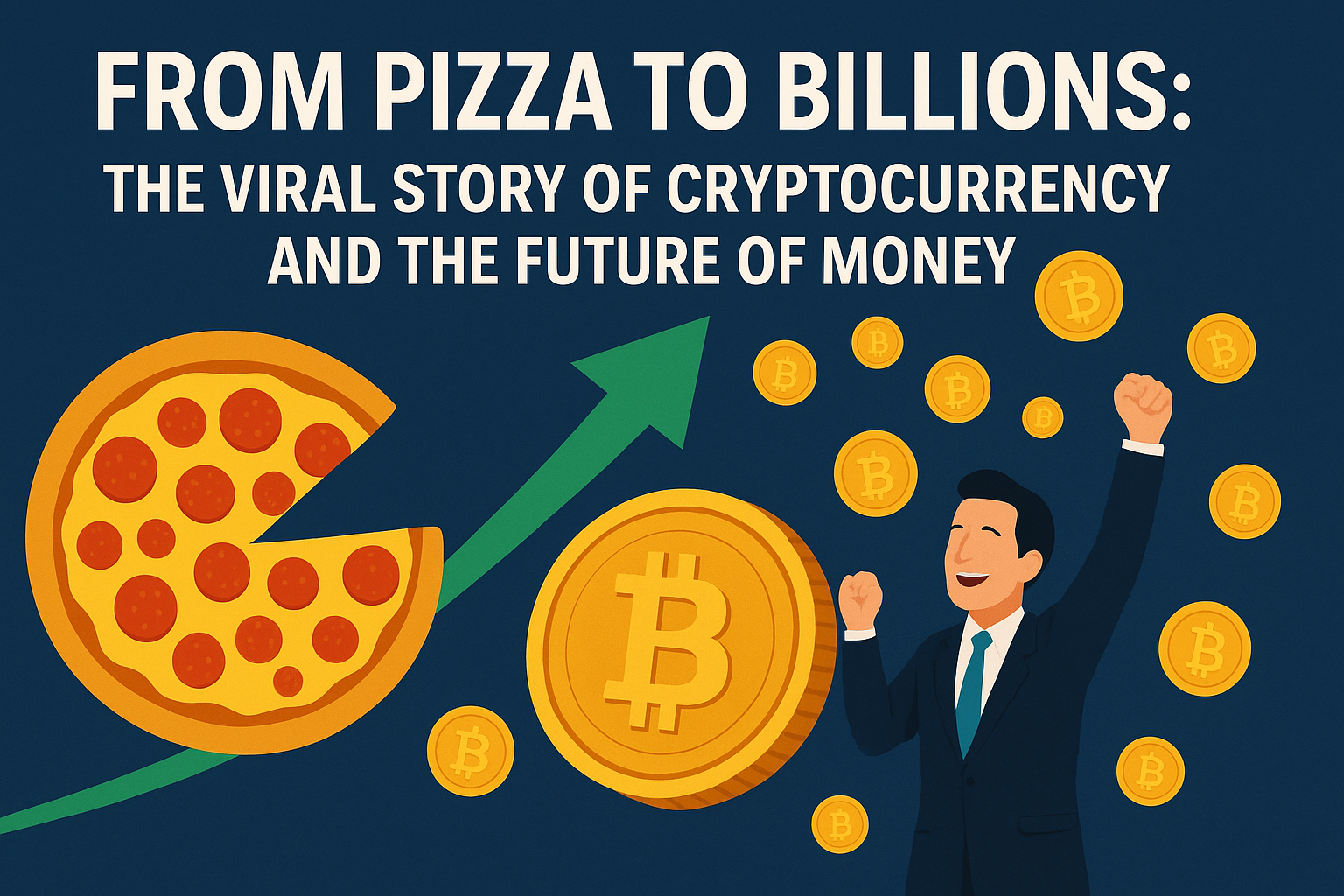From Pizza to Billions: The Viral Story of Cryptocurrency and the Future of Money
Imagine this: in 2010, a man bought two pizzas for 10,000 Bitcoin. At the time, those coins were worth about $40. Today, the same amount of Bitcoin would be worth hundreds of millions of dollars. That’s not just a story—it’s a legend in the crypto world, and it shows how dramatically digital money has transformed our idea of wealth.
Cryptocurrency is not just about Bitcoin anymore. It’s about a revolution that challenges banks, governments, and even the way we think about money itself. The question everyone keeps asking is: is this the future of money, or just another bubble waiting to burst?
The Viral Rise of Digital Gold
Bitcoin was the first, but it opened the door to a flood of other cryptocurrencies—Ethereum, Dogecoin, Solana, Ripple, and thousands more. Each one comes with its own community, memes, and promises. Some are serious projects aiming to transform finance; others start as jokes but end up creating millionaires.
Dogecoin, for example, was literally a meme. It was created as a parody in 2013, featuring the famous Shiba Inu dog. But when Elon Musk started tweeting about it, the price skyrocketed, and thousands of early believers suddenly had fortunes in their pockets.
The viral nature of crypto isn’t just about money—it’s about culture. Every tweet, every TikTok, every Reddit post has the power to send a coin’s value flying. Traditional finance works with balance sheets and long-term planning. Crypto works with memes, hype, and community passion.
Stories That Spark Dreams
Why do people keep jumping into crypto, even with all the risks? Because the stories are irresistible.
- The teenager who turned $500 into millions by holding Ethereum.
- The factory worker who quit his job after a lucky investment in Shiba Inu.
- The small-town mom who discovered NFTs and built a digital art empire.
These stories spread like wildfire online. They give people hope that maybe, just maybe, they could escape the rat race and achieve financial freedom. In a world where salaries grow slowly but prices rise quickly, the dream of multiplying your money overnight is too powerful to ignore.
The Dark Side Nobody Talks About
But not every story has a happy ending. For every crypto millionaire, there are countless others who bought at the top and lost everything when the market crashed. Scams, rug pulls, and fake projects are everywhere. People have been tricked into sending their life savings to anonymous wallets that vanish overnight.
And then there’s volatility. One day your portfolio is worth $10,000, the next it’s $4,000. Crypto doesn’t sleep—it trades 24/7, and the rollercoaster never stops. The same volatility that creates millionaires also creates heartbreak.
Still, the risk is part of the thrill. In many ways, that’s why crypto keeps going viral. The highs are dizzying, the lows are devastating, and everyone watching feels like they’re part of a massive, global drama.
The Technology That Could Change Everything
Beyond the hype and speculation, there’s real innovation happening. The blockchain—the technology behind crypto—is like a digital public ledger that nobody can cheat. It allows people to trade value directly without banks, intermediaries, or borders.
Ethereum introduced smart contracts, pieces of code that execute automatically when conditions are met. This opened the door to decentralized finance (DeFi), where people can lend, borrow, trade, and earn interest without ever stepping into a bank.
NFTs turned digital art, music, and collectibles into unique assets you can own and sell. Suddenly, creators could earn directly from fans without relying on galleries or record labels.
Even governments are paying attention. Some are experimenting with central bank digital currencies (CBDCs). Others are banning crypto entirely, afraid of losing control. Either way, it’s clear: crypto is forcing the entire world to rethink money.
The Psychology of Viral Wealth
Why does crypto dominate headlines, YouTube videos, and social media trends? Because it hits the deepest human emotions:
- Fear of missing out (FOMO): Nobody wants to be the person who ignored Bitcoin at $1 or Ethereum at $10.
- Hope: Even small investments feel like lottery tickets with the potential for life-changing rewards.
- Community: Crypto isn’t just about coins—it’s about belonging to a movement, whether it’s Bitcoin maximalists, Ethereum believers, or meme coin armies.
This combination makes crypto stories go viral faster than almost anything else online. It’s money, technology, and culture blended into one.
The Future: Where Are We Headed?
Will crypto replace traditional money? Some say yes, some say never. But one thing is certain: it’s not going away.
- Big companies like Tesla, Microsoft, and PayPal already accept or experiment with crypto.
- Countries like El Salvador have made Bitcoin legal tender.
- Financial giants like BlackRock are creating crypto investment products.
The world’s financial system is slowly being forced to adapt. Maybe Bitcoin won’t replace the dollar, but digital assets are becoming part of the new normal.
The most viral question remains: who will be the next success story? Which coin, project, or NFT will create the next wave of millionaires? Nobody knows, and that’s exactly why people keep watching, investing, and sharing.
Final Thoughts
From two pizzas to billions of dollars, from memes to revolutions, the story of cryptocurrency is one of the most viral phenomena of our time. It’s not just about money—it’s about dreams, risk, culture, and the hope for a different future.
Maybe you’ll be the next person telling your story: the one who took a chance, believed in the impossible, and turned a small step into a life-changing leap. Or maybe you’ll be the one who learned a hard lesson about risk. Either way, the world will keep watching, because the crypto story is far from over.
One tweet, one coin, one decision—that’s all it takes to change everything.




